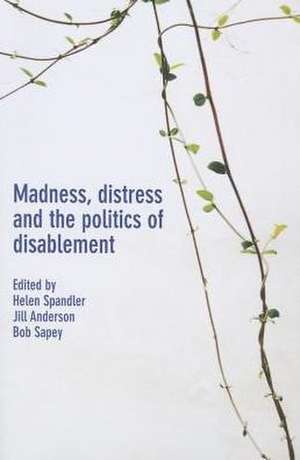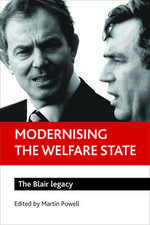Madness, Distress and the Politics of Disablement
Editat de Helen Spandler, Jill Anderson, Bob Sapeyen Limba Engleză Paperback – 15 iun 2015
This book explores the challenges of applying disability theory and policy, including the social model of disability, to madness and distress. It brings together leading scholars and activists from Europe, North America, Australia, and India, to explore the relationship between madness, distress, and disability. Whether mental health problems should be viewed as disabilities is a pressing concern, especially since the inclusion of psychosocial disability in the UN Convention on the Rights of Persons with Disabilities. This book will appeal to policy makers, practitioners, activists, and academics.
| Toate formatele și edițiile | Preț | Express |
|---|---|---|
| Paperback (1) | 346.43 lei 3-5 săpt. | |
| Bristol University Press – 15 iun 2015 | 346.43 lei 3-5 săpt. | |
| Hardback (1) | 835.63 lei 6-8 săpt. | |
| Bristol University Press – 15 iun 2015 | 835.63 lei 6-8 săpt. |
Preț: 346.43 lei
Nou
Puncte Express: 520
Preț estimativ în valută:
66.31€ • 72.05$ • 55.74£
66.31€ • 72.05$ • 55.74£
Carte disponibilă
Livrare economică 31 martie-14 aprilie
Preluare comenzi: 021 569.72.76
Specificații
ISBN-13: 9781447314585
ISBN-10: 1447314581
Pagini: 320
Dimensiuni: 152 x 229 x 30 mm
Greutate: 0.59 kg
Editura: Bristol University Press
Colecția Policy Press
ISBN-10: 1447314581
Pagini: 320
Dimensiuni: 152 x 229 x 30 mm
Greutate: 0.59 kg
Editura: Bristol University Press
Colecția Policy Press
Notă biografică
Helen Spandler is a reader in mental health at the University of Central Lancashire. Jill Anderson coordinates the Mental Health in Higher Education project and is a doctoral student at Lancaster University. Bob Sapey is a founding member of Critical and Creative Approaches to Mental Health Practice.
Cuprins
About the authors
Foreword by Jenny Morris
Introduction
Bob Sapey, Helen Spandler and Jill Anderson
Part One: Disjunctures between disability and madness
1. Unreasonable adjustments? Applying disability policy to madness and distress
Helen Spandler and Jill Anderson
2. What we talk about when we talk about disability: making sense of debates in the European user/survivor movement
Jasna Russo and Debra Shulkes
3. Inconvenient complications: on the heterogeneities of madness and their relationship to disability
Nev Jones and Timothy Kelly
4. Unsettling impairment: mental health and the social model of disability
William J Penson
Part Two: Theorising distress and disablement
5. Towards a socially situated model of mental distress
Jerry Tew
6. The Capabilities Approach and the social model of mental health
Jan Wallcraft and Kim Hopper
7. Psycho-emotional disablism in the lives of people experiencing mental distress
Donna Reeve
Part Three: Applying social models of disability
8. Psycho-emotional disablism, complex trauma and women’s mental distress
Shelley Briggs and Fiona Cameron
9. Linking ‘race’, mental health and a social model of disability: what are the possibilities?
Frank Keating
10. Social models of disability and sexual distress
Meg John Barker and Alex Iantaffi
11. The social model of disability and suicide prevention
Helen Spandler interviews David Webb
Part Four: Universalising disability policy
12. Advancing the rights of users and survivors of psychiatry using the UN Convention on the Rights of Persons with Disabilities
An interview with Tina Minkowitz
13. UN Convention on the Rights of Persons with Disabilities: out of the frying pan into the fire? Mental health service users and survivors aligning with the disability movement
Anne Plumb
14. The global politics of disablement: assuming impairment and erasing complexity
China Mills
15. Disabilities, colonisation and globalisation: how the very possibility of a disability identity was compromised for the ‘insane’ in India
Bhargavi V Davar
Part Five: Meeting places
16. Neurodiversity: bridging the gap between the Disabled People's Movement and the Mental Health System Survivors' Movement?
Steve Graby
17. Distress and disability: not you, not me, but us?
Peter Beresford
18. 'It’s complicated': blending disability and mad studies in the corporatising university
Kathryn Church
19. Solidarity across difference: organising for democratic alliances
Mick McKeown and Helen Spandler
20. Beyond the horizon: the landscape of madness, distress and disability
Jill Anderson, Helen Spandler and Bob Sapey
References
Index
Foreword by Jenny Morris
Introduction
Bob Sapey, Helen Spandler and Jill Anderson
Part One: Disjunctures between disability and madness
1. Unreasonable adjustments? Applying disability policy to madness and distress
Helen Spandler and Jill Anderson
2. What we talk about when we talk about disability: making sense of debates in the European user/survivor movement
Jasna Russo and Debra Shulkes
3. Inconvenient complications: on the heterogeneities of madness and their relationship to disability
Nev Jones and Timothy Kelly
4. Unsettling impairment: mental health and the social model of disability
William J Penson
Part Two: Theorising distress and disablement
5. Towards a socially situated model of mental distress
Jerry Tew
6. The Capabilities Approach and the social model of mental health
Jan Wallcraft and Kim Hopper
7. Psycho-emotional disablism in the lives of people experiencing mental distress
Donna Reeve
Part Three: Applying social models of disability
8. Psycho-emotional disablism, complex trauma and women’s mental distress
Shelley Briggs and Fiona Cameron
9. Linking ‘race’, mental health and a social model of disability: what are the possibilities?
Frank Keating
10. Social models of disability and sexual distress
Meg John Barker and Alex Iantaffi
11. The social model of disability and suicide prevention
Helen Spandler interviews David Webb
Part Four: Universalising disability policy
12. Advancing the rights of users and survivors of psychiatry using the UN Convention on the Rights of Persons with Disabilities
An interview with Tina Minkowitz
13. UN Convention on the Rights of Persons with Disabilities: out of the frying pan into the fire? Mental health service users and survivors aligning with the disability movement
Anne Plumb
14. The global politics of disablement: assuming impairment and erasing complexity
China Mills
15. Disabilities, colonisation and globalisation: how the very possibility of a disability identity was compromised for the ‘insane’ in India
Bhargavi V Davar
Part Five: Meeting places
16. Neurodiversity: bridging the gap between the Disabled People's Movement and the Mental Health System Survivors' Movement?
Steve Graby
17. Distress and disability: not you, not me, but us?
Peter Beresford
18. 'It’s complicated': blending disability and mad studies in the corporatising university
Kathryn Church
19. Solidarity across difference: organising for democratic alliances
Mick McKeown and Helen Spandler
20. Beyond the horizon: the landscape of madness, distress and disability
Jill Anderson, Helen Spandler and Bob Sapey
References
Index
Recenzii
“‘Distress,’ ‘disability,’ ‘impairment,’ ‘madness,’ ‘recovery’—all are stress tested for their meanings and their options for social activism rehearsed. This is an invaluable book for students of the perennially contested topic of mental health.”
“Significant and a must for undergraduates and postgraduates in the fields of sociology, social theory, and social policy.”
“This text brings together insights from critical disability studies, mad studies, and politicized analyses of mental health to develop a theoretical, empirical, and activist response to wider conditions of disablement. The authors clearly demonstrate the potency of theory and the centrality of activism and this book will be of interest to anyone interested in developing politics in a time of austerity.”
"A rewarding and frequently compelling read that does not shy away from grappling with the uncertainties surrounding its field of inquiry."
“An enjoyable and thought-provoking introduction to the relationship between mental health problems and disability.”














